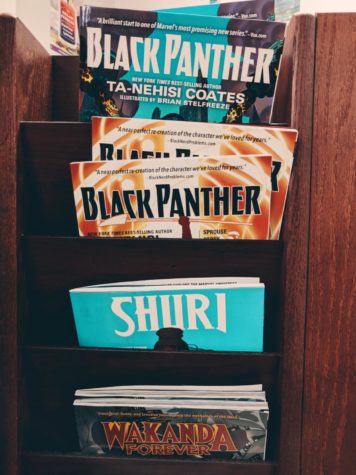A Review of ‘Black Panther: Wakanda Forever’
The long-awaited sequel to ‘Black Panther’ has created waves among the Marvel fandom, from the movie’s response to its original star’s death to the diversity the movie introduces.
“Black Panther: Wakanda Forever” broke records by being the first film to top the box office for five consecutive weeks. Huerta said, “It’s beautiful to see ourselves represented in a different way.”
The theater was filled with a teary-eyed audience. It was only about two minutes into the movie. Not many films stir the emotions of the general public, but watching the opening scenes of ‘Black Panther: Wakanda Forever’ clearly resonated with most audience members.
The movie was released on November 11th, 2022, and, as of February 2nd, 2023, has grossed $841.3 million worldwide in its initial theatrical run. ‘Black Panther: Wakanda Forever’ dominated the Thanksgiving box office, second only to fellow Marvel Studios release ‘Doctor Strange in the Multiverse of Madness’ in opening weekend earnings in 2022. The movie topped the box office for five consecutive weeks.
After Chadwick Boseman, who played the lead role of T’Challa in the first ‘Black Panther’ film, passed away in 2020 from colon cancer, Marvel’s decision to not recast the role of T’Challa was met with much curiosity, as people wondered what plotline future movies would follow and which character would take the lead.
Continuing from the standard that was set in the first movie, ‘Black Panther: Wakanda Forever’ is an exploration of Afrofuturism as well as a celebration of black culture, especially of black women, who are featured in prominent and powerful roles. However, Marvel surprised most of its fans with what the sequel includes.
The original plan for this sequel would have looked completely different, according to writer-director Ryan Coogler. As he stated in an interview with The New York Times, “It was absolutely nothing like what we [originally] made. It was going to be a father-son story from the perspective of a father, because the first movie had been a father-son story from the perspective of the sons.”
Incorporating Boseman’s death as the starting point of the film might have seemed the easiest path for the filmmakers. It was obvious to them that using technology such as CGI to bring Boseman “back to life” would be met with heavy criticism.
Previously, movies such as ‘Rogue One: A Star Wars Story,’ ‘Hawaii Five-0,’ and ‘Furious 7’ have used computer-generated imagery or digital reconstruction to bring back characters whose original actors have passed away. Because of this, many moral concerns have been brought to light, and filmmakers have used much caution or come up with alternatives to bringing back actors through technology.
According to Joe Robert Cole, the co-screenwriter for Wakanda Forever, “Just practically, everyone was going to be waiting to see how we dealt with [Boseman’s death], so doing it right up front made sense. In terms of the characters, we needed to introduce a different version of Shuri [T’Challa’s sister, played by Letitia Wright]. We’re showing the moment that she becomes a different person than the person we met. She’s the smartest person in the world, but she can’t save her brother. What does that do to you?” Therefore, by starting with the grief of a nation that has just lost its beloved king, the stage was set for a new Black Panther to take his place and save a threatened Wakanda.
The movie mainly focuses on how the young Princess Shuri, who is only in her twenties, navigates the loss of her brother while balancing pressure from her mother, Queen Ramonda, and her role in the kingdom in the aftermath of T’Challa’s death. When all hope seems lost, Shuri is the one who repeatedly steps forward and does anything in her power to protect those she cares about. She takes on the mantle of the Black Panther as a last resort to deal with threats from a previously unknown and incredibly technologically advanced nation.

The introduction of this new nation gives way to presenting K’ulk’ulkan, the first mutant introduced in Marvel’s comic books. In ‘Wakanda Forever,’ he is most well known as Namor, the leader of the underwater kingdom of Talokan. While Namor’s kingdom of Atlantis in the comics is Greco-Roman, Talokan and its people are heavily inspired by Mexican mythology, taking symbols and its language from Mayan culture.
In an interview with the Los Angeles Times, production designer Hannah Beachler explained, “…We want to make sure we’re approaching [Talokan] in the same way we approached Wakanda, with the same sort of integrity and ingenuity and understanding of that culture in order to make a new culture that stems from that.” The meticulous attention to detail in the movie was evident, from the designs in the stunning underwater architecture, subject of various breathtaking scenes, to the intricate jewelry that the people of Talokan wear.
Namor himself wears specially tailored costumes with designs inspired by Mayan motifs, his appearance still connecting back to his designs in the original Marvel comics. Tenoch Huerta Mejía, the actor who plays Wakanda Forever’s primary antagonist, portrays the confidence and dignity appropriate for a leader.
Everardo Gout, the director of a movie that Huerta previously starred in, expressed his pleasure with Huerta’s interpretation of the character. In a New York Times interview, he said, “His performance as Namor is so great because he imbues the character with his own identity…He always has the same smile and the same way of speaking, so he grounds the character on something palpable — real humanity.”
Huerta’s prominent role and acclaimed performance in ‘Wakanda Forever’ has helped him accomplish his goal of highlighting the significance of his success as a brown-skinned actor in a white-dominated field. As stated in the same New York Times article, “Offscreen, Huerta is an outspoken antiracism activist who uses his platform to demand reparations for brown-skinned Mexicans, whether they identify as Indigenous or not. He profoundly related to how proudly Namor embraced and protected his Mayan origins.”
“It’s beautiful to see ourselves represented in a different way,” Huerta expressed with pride.
Pride in the extensive representation in ‘Wakanda Forever’ is shared by most fans, many of whom were surprised at how Marvel expanded beyond the main focus on the Afrofuturistic civilization of Wakanda in the first installment. The soundtrack of the movie includes songs in English, Spanish, and Xhosa, which is one of the official languages of South Africa, acting as a microcosm of the movie’s presentation of a more inclusive narrative that is not often seen in mainstream media. The diverse cast of actors, consisting of both returning stars and newer talents, and their dedication to the continued openness to different cultures and languages, with Xhosa, Yucatec Maya, Haitian French, Spanish, and English being the languages featured in the film, all contribute to this unique presentation of diversity in a blockbuster film.
Similar to the ways in which ‘Black Panther’ created much excitement among a wide audience in the aftermath of its release, even earning itself a Best Picture nomination at the Academy Awards, ‘Black Panther: Wakanda Forever’ has fans and critics all over the world in awe at how it surpassed their expectations.
The sequel has also earned itself a bevy of Oscar nominations, most notably a Best Supporting Actress nomination for Angela Bassett, who plays Queen Ramonda.
According to CNN media critic Brian Lowry, “‘Black Panther: Wakanda Forever’ faced an inordinate degree of difficulty, addressing the tragic death of Chadwick Boseman… That the movie manages to strike that somber chord and still deliver as Marvel-style entertainment represents a major accomplishment.”
‘Black Panther: Wakanda Forever’ was released on Disney+ for streaming on February 1, 2023. To watch it (subscription required), click HERE.
“It’s beautiful to see ourselves represented in a different way,” Huerta expressed with pride.
Elizabeth Colón is a Copy Chief for ‘The Science Survey.’ Elizabeth finds that the most appealing aspect of journalistic writing is how much...

